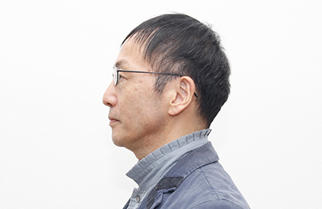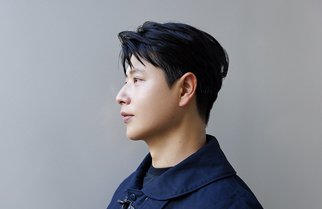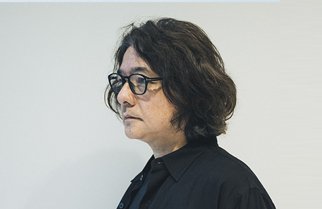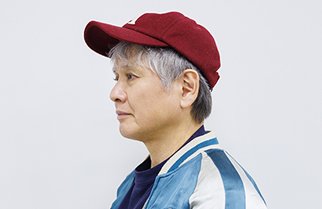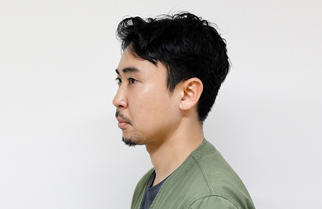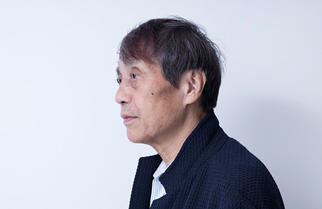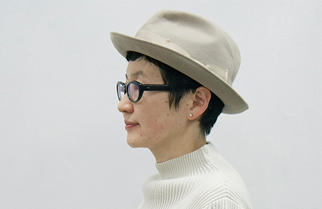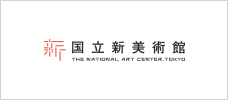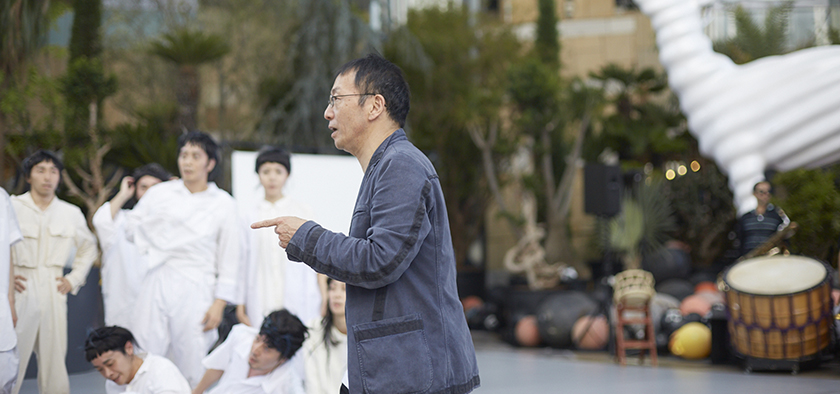
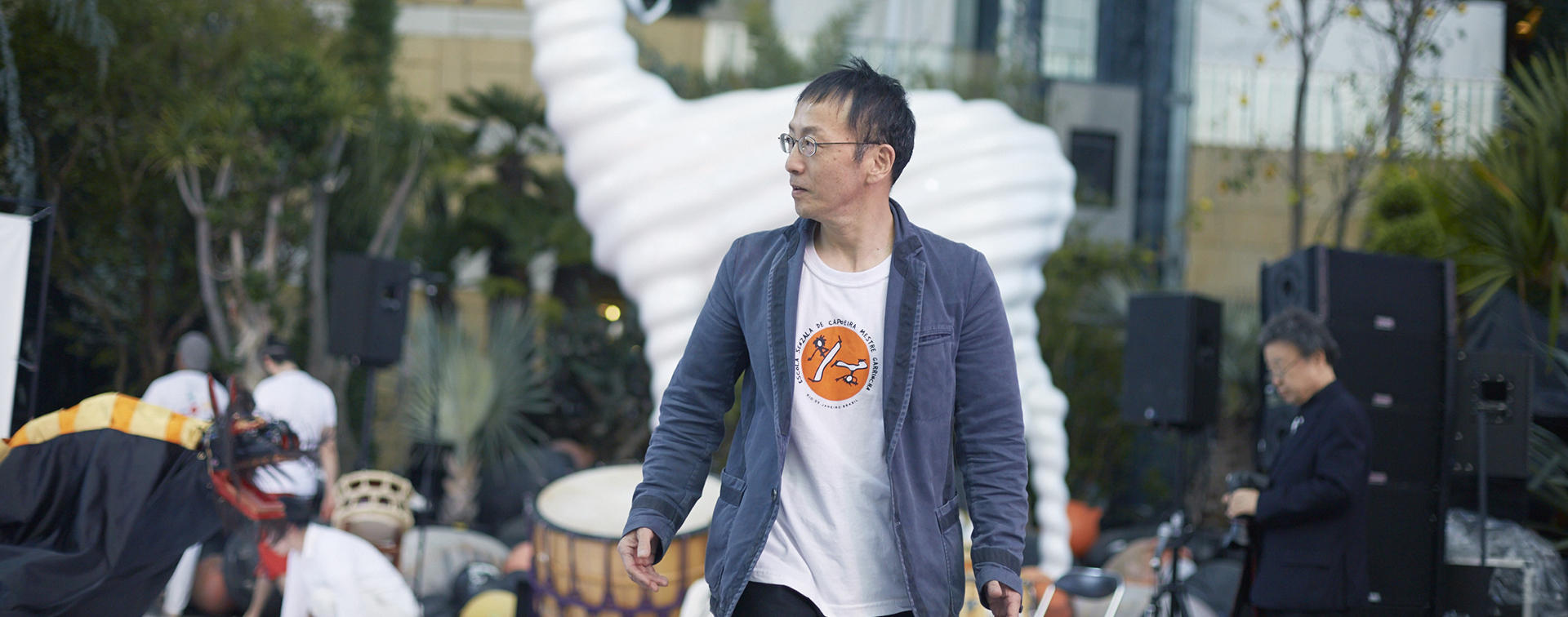
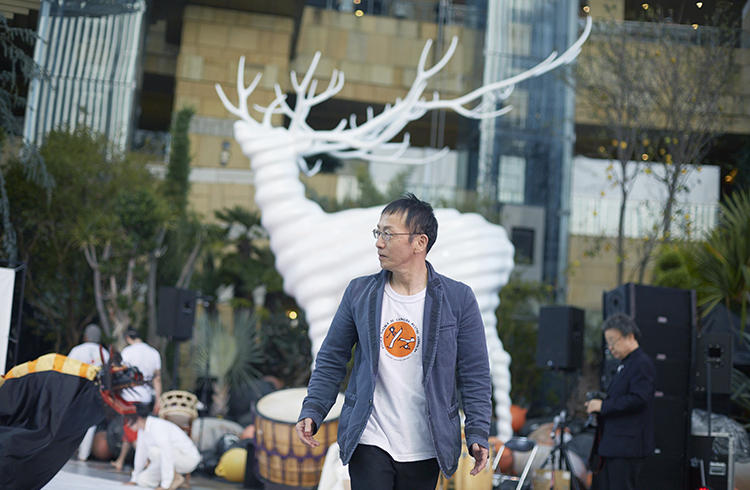
Creating a legacy that will continue after the Olympics
A cultural circus that appears and vanishes like a dream
Hideki Noda, theater director, actor and founder of the theater production company "Noda Map" has presented numerous acclaimed plays in Japan and abroad. During Roppongi Art Night 2016, a performance was given by Tokyo Caravan, a theatrical troupe founded by Noda and which aims to lead a new cultural movement based on the mingling of cultures. Noda was busy rehearsing for the "Tokyo Caravan in Roppongi" performance, but we managed to ask him about his thoughts on towns, culture and the future.
The things that are needed to develop a town
Towns in Japan look the same everywhere, don't they? Their similarity strikes me when we go touring around the country. When we go to the regions, the area in front of the stations all look the same because the shops standing there are the same. In other countries, there are strict regulations for town development - in some places, people are adamant about keeping out chain stores. Opinion will be divided on this, but setting down rules is one way of developing a town.
I think it will be difficult to use art or other cultural things to develop a town; unless there's something outstanding, the town will probably end up looking artificial. This is because there are few people in Japan who appreciate culture. There are many people in powerful positions in the political and economic fields who have absolutely no interest. And the odd thing about people who suddenly assume these top positions is that they go to theaters overseas and instantly become opera lovers. (laughs) And they probably hadn't even gone to theaters in Japan before.
Various activities are being planned for the Tokyo Olympics in 2020 and the most important thing is to have genuine interest in them, but I sometimes wonder if people really want to be involved. I'm kind of complaining.
Focusing on quality rather than on quantity
Events are often held with names like "festival for so-and-so to foster exchange". They might offer some fun, but in Japan, most of these events are geared toward children. When children grow up to be a certain age and become a bit cynical, they don't go to these events. Holding events is not easy; people will look at the content and pick and choose, and that is a factor we always have to consider.
When I became artistic director at the Tokyo Metropolitan Theatre, which is a publicly operated facility, I found that the people there were concerned about the operating utilization rate. At meetings, they were prioritizing those matters instead of thinking about the actual performances. I think the job of an artistic director is to be stubborn about quality and to say no to anything that is not up to standard. And so that is what I did. Then I was told that such a stance was unprecedented at publicly operated theaters, and complaints might come from people who think that Tokyo citizens should be allowed to do what they please in Tokyo facilities. So in the end I persuaded them by saying that I would take responsibility for everything. You see, there are many people who don't want to be held responsible in the event of problems.
Aside from "Tokyo Caravan in Roppongi", many other programs will be held at Roppongi Art Night, but I don't think one should take the view that the more artists there are, the more exciting it will be. That is the view that tends to be taken toward public projects, but instead of valuing numbers, we should go back to basics and place importance on quality.
Culture is about presenting unique ideas
Holding an event is about presenting your own unique ideas. If you are timid about doing that, there is no meaning in having culture. I think timidity is probably the reason why towns in Japan all look the same. Of course, there's no need to be fussy about quality all the time, but you should at least make your preferences clear and stand by them.
Put simply, Tokyo Caravan is a cultural circus. It all began with the idea to hold some kind of cultural program ahead of the Tokyo Olympics. The discussions we held were very abstract though. People were saying things like, "It is wonderful how in Japan, traditional and modern elements come together," but no one came up with any actual ideas.
So I proposed a cultural circus that would pop up in the town during the weekend; it would put on a performance the following evening and then suddenly disappear like a dream. I thought that kind of experience would be fun. It's exciting when something like a circus comes to town, isn't it? Of course the performance needs to be good, but I thought the process of the circus coming and then going is in itself quite interesting.
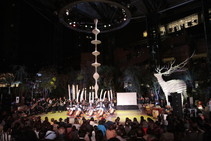
Tokyo Caravan
A theatrical troupe led by Hideki Noda consisting of artists from many genres. It seeks to create a cultural movement based on the concept that culture is born through interaction between people. During Roppongi Art Night, an event dubbed "Tokyo Caravan in Roppongi" was held at the Roppongi Hills Arena (top photo/photo by Kishin Shinoyama) with the participation of Tokyo Ska Paradise Orchestra and actor Rie Miyazawa.
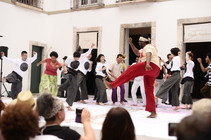
The photo below is of the workshop held during the Rio de Janeiro Olympics in August 2016.

Giving shape to something everyone felt clueless about
To be honest, I initially regretted making the proposal because it seemed like a difficult project. It was the first time that such a thing had been attempted, and no one knew what to do. But the project has led me to discover a lot of things and I feel that I'm ultimately the one who has benefited most. (laughs) Tokyo Caravan has performed at the Rio Olympics and in Tohoku: the experience we've gained has made us more certain of what we're doing and I think that will be reflected in the upcoming performance in Roppongi.
These performances do require a manual of some sort. But I'm against making a manual for every step; if Tokyo Caravan ever comes to the point of just going through the motions for the sake of it, then it will be time to change our method. A long time ago, there was a theater company that I owned but disbanded. I started the company with the aim of doing plays, but after a while, I found that I was putting on plays in order to keep the company going.
I had lost sight of my main aim; when something like that happens, you need to stop it immediately, even if what you are doing has gained momentum. You have to make that decision or else things will go awry. But people have to make a livelihood, so it's easier said than done.
Valuing words in a visually-oriented age
The purpose of Tokyo Caravan is to go out to different places to meet people and to react to the various elements in the regions such as tradition, exploring ways to integrate all these elements in our performances. Since much of it is impromptu, the content is influenced a lot by who is performing. For the upcoming event, Tokyo Ska Paradise Orchestra will be in charge of the music; they make things amazingly lively. Instead of doing straightforward collaboration, I'm always thinking of ways to make our performance look different by giving it just a little tweak. Tokyo Caravan still has a long way to go, but we're now surer of our direction, and I hope our performances will make people feel positive.
When I look at art and dance and other performances, I feel that we live in times where words have little significance. I think young people have become very discerning visually, but they're less sensitive toward words, so I'm trying to devise ways to get their attention.
For the performance in Roppongi, there is not much of a storyline - it's really more like a poem. But a poem can also be compelling; after all, Bob Dylan won the Nobel Prize. (laughs)
Experiences and memories that last long after the Olympics
I've made the big declaration that I want to make Tokyo Caravan the legacy of the Tokyo Olympics, but we're not going to have a special facility built for it. We'll be able to continue our activities anywhere as long as we have some space. While a big stage has been set up for the event in Roppongi, we could also use places like an elementary school gym as was the case when we toured in Tohoku.
One thing I wish to always take with us is the Ether statue that Kohei Nawa-kun made and which is the symbol of Tokyo Caravan. Even if it's only a small version, it would be nice to have that symbolic statue installed on stage. Unfortunately, the budget didn't make that possible on our Tohoku tour. As long as we have Ether though, we don't need much else.
As for things that last, more important than the buildings that will remain are the experiences that the people have of our performances and their memories of them. I hope that this cultural program that was started for the Tokyo Olympics will continue long after the Olympics are over. So we need to put our efforts into this and make it interesting for everyone.
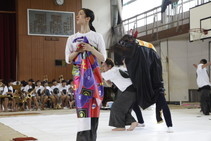
Tokyo Caravan in Tohoku
An event held by Tokyo Caravan in the Tohoku region in September 2016. The troupe had performed at the Rio de Janeiro Olympics in the previous month and the event marked its first tour in Japan. The performers, which included actor Takako Matsu, held performances in Miyagi and Fukushima. Workshops were also held to explore new ways of expression; participating in the workshops were local elementary school children, members of a wind instrument club, traditional arts performers and festival performers.
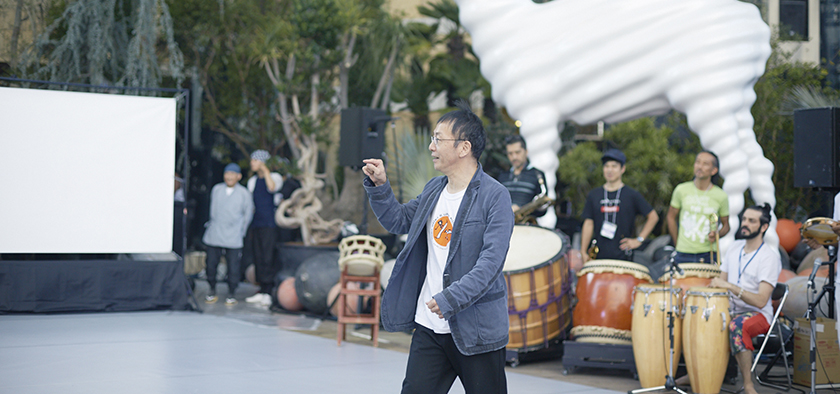
Liking Tokyo despite all its faults
I was born in Nagasaki and came to Tokyo when I was four. I've lived in Tokyo for 55 years so I suppose I like it here, despite my grumbling. There's nothing I specifically like about Tokyo, although there are plenty of things I dislike about it. For example, when you walk in front of a fast food restaurant, there is that smell. Everyone hates cigarette smoke; why don't they hate that fast food smell?
I hate the loud music that is played in the streets. I hate those shop banners with "Sale" written on them. They completely spoil the scenery. Whenever there is an event like the Olympics, people instantly put up banners. Yet foreigners are delighted when they see those banners lined up in a row. They also like the lanterns at izakaya (pubs). So not everyone thinks those things are awful.
I like Tokyo and find the city interesting because I grew up here and because I'm very Japanese. Of course, I think that the streets in Europe are lovely; when I go to cities like London and Paris, I'm impressed by how they have preserved all that architecture. When there is an attempt to make something new, people complain about the color of the planned building and everything else about it - that stance is awesome. But it's not necessarily always a good thing not to build anything new, so it's a difficult issue.
Roppongi used to be the center of "shingeki"
After Roppongi Hills was built, my visits to Roppongi have become fewer. In the past, the Haiyuza theater in Roppongi, was one of the main theaters for "shingeki" (Western-style modern drama). When I was a student, I performed for one single day at Haiyuza. It was a terrible play put on by an angura (underground) theater company. For some reason, a sound truck came along and although it hadn't been planned beforehand, I was made to stand at the very front and ended up being hit by cracker balls that the people in the truck threw at me. (laughs)
I once did backstage work for a theater company I liked which Morio Kazama-san and Makoto Otake-san belonged to; the actors were unknowns at the time. My job was to make snow fall on stage, but I did it badly having never done such a thing before, and the theatrical director yelled so at me. I also did a two-person play with Isao Hashizume-san at Jiyugekijo, which is a theater that is now gone. I do have quite a lot of memories connected to Roppongi.
When I was younger, I went drinking with Kanzaburo [Nakamura]; I had my first Peking duck at Chugoku Hanten on Roppongi Dori. But more than anything, the area around the Almond shop and the Roppongi intersection will be the eternal image I have in my mind of Roppongi.
Holding performances in different parts of Roppongi
Everyone thinks of Roppongi as being the place for the latest phenomena; all my friends from abroad have heard of Roppongi. It seems to be in a good cultural position.
I'm happy that Tokyo Caravan is going to perform in Roppongi; the last time we performed was in Soma City [in Fukushima Prefecture] and it will be interesting to follow that up with a performance in Roppongi which is such a contrasting place. If we get a good response, perhaps we could do it again next year and in the following years, in different places. It would be nice if we could perform in another spot in Roppongi such as on the lawn in Tokyo Midtown. That is, if you could offer us the opportunity.
The people who come to Roppongi Art Night
This may be a prejudiced view, but I have a feeling that the people who come to Roppongi Art Night are the same people who come to Shibuya to revel on Halloween or when the Japanese soccer team wins. We don't usually perform in front of such people so I'm looking forward to the upcoming event in a weird way. (laughs)
Having mentioned the soccer fans, I must admit that in 2002, I went to watch the World Cup; I was supposed to go to London on that day, but without telling anyone at my office, I changed my flight to the following day and went to Saitama Stadium to see the first-round match between Japan and Belgium. Katsuhiko Hibino-san warned me that I would stand out in the crowd if I didn't wear the [supporters'] blue shirt. I told him that I wouldn't wear the shirt even if I owned one. So I went in my usual clothes and indeed did stand out. But every time a goal was scored, I was jumping up and hugging people around me that I didn't know. (laughs) The spirit of nationalism that came pouring out from within was embarrassing but overwhelming.
Interesting people make interesting spaces
I think that ultimately, the interestingness of locations and spaces are not about specific details but about people. After all, dull people can only make dull spaces. Interesting people aren't necessarily people who say things that make you laugh. There are people who don't talk a lot but are interesting nonetheless. An interesting person can be taciturn and creepy, yet he will be able to make intriguing things.
I think education is the key to triggering people's interest in culture. If there were more projects like Tokyo Caravan, and if the quality of their performances became higher, people would easily be interested. But if you really want to have a full-fledged culture, a great deal of money is required. You have to be prepared to make a proper investment.
Nowadays whenever there is talk of the Tokyo Olympics, people tend to say, "Why are they spending so much?" But I don't think the issue is solely about whether the budget is big or small; I think the problem lies in not being able to create things that are worth the money. When big events like the Olympics are held, there are people who try to grab as much money as they can, but what we ought to be doing is to make money through cultural activities on an everyday basis.
Appreciating things that are absurd
Society seems to be reverting to the trend to value things that are useful such as useful streets and useful words and so on. In the '60s and '70s, people wrote the so-called poems of absurdity to try to crush that atmosphere. Poetry magazines were popular with young people. Today, no one sees the value in words that are not useful - words that are not helpful in making money.
At the same time though, there's no point in using words that people don't understand. In the past, when I used absurd poems in my plays, it was fairly easy to get my message across to the audience. People had fun trying to interpret the symbolic words. I suppose that in a sense, the theater has now become the last stronghold of language.
We should appreciate words the way children do. Children are the ones who love nonsensical words the most, aren't they? They hear the word "poop" and they won't stop laughing. I think it's important to have that children's sense. So we mustn't disapprove of poop. (laughs)
Editor's thoughts
We photographed Hideki Noda-san while he was overseeing Tokyo Caravan's rehearsal at Roppongi Hills Arena. In the background, there are the White Deer and Ether statues made by Kohei Nawa-san as well as the "forest" which was put together by Seijun Nishihata, the plant hunter we interviewed previously.
(edit_kentaro inoue)




